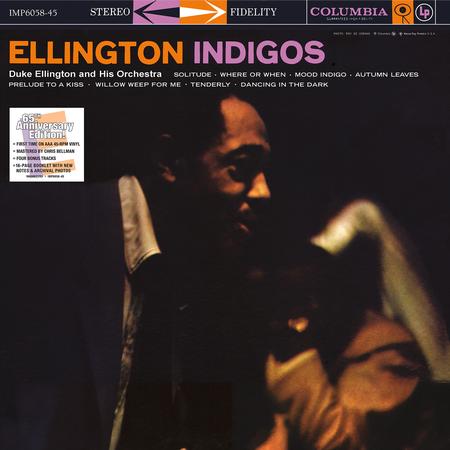Hi-Fi Has Been Very Good to Duke Ellington
Indigos is but one example why
Hi-Fi has long been very good to Duke Ellington, beginning in 1950 when long playing records and tape recording allowed him to finally deliver Masterpieces by Ellington an album of previously impossible to release to the home listening public, live concert length arrangements of his most popular and enduring compositions. Until then only attendees of his live concerts got to hear them.
Finally Ellington was freed from the constraints of the three minute 78rpm single—not that many people got to hear the album when first released. Few owned long playing record players. Over time that changed and by the time stereo became a reality, Ellington was able to present his big and glorious sounding orchestra to music lovers and "hi-fi nuts" throughout the world. The sound on many of these Columbia "6-eye" Ellington recordings are near-religious experiences, which makes sense since the 30th street studio was a de-sanctified church.
But let's not get carried away here: by the time Ellington began recording in hi-fi for Columbia Records, he'd moved well past his creative peak and mostly he was re-hashing his and Strayhorn's past compositional glories but with spectacular sound and sumptuous arrangements designed to squeeze every last bit of hi from the fi. Mostly because Ellington's Columbia catalog contains many adventurous highlights including his Anatomy of a Murder soundtrack, and especially the "folk opera" A Drum Is a Woman recorded in 1956 for Columbia and produced later as a television special and later his 1961 piano trio album Piano in the Foreground.
This set, recorded in the Fall of 1957, is of mostly covers, with "Mood Indigo" and the opener "Solitiude" the only Ellington compositions. And of course among his greatest collection of veteran musicians were delivering the musical goods.
One can only imagine guys like Johnny Hodges, Paul Gonsalves, Harry Carney, Ray Nance and the others finally (and of course Duke himself) hearing their instruments and performances reproduced with this high level of timbral, textural and dynamic verisimilitude on a really wide 50's era stereo soundstage.
The pace is slow, the fireworks few though the highlights are deep. The opener, a version of "Solitude" written by Ellington in 1934 is a stunning arrangement profoundly performed. This album sounds as if it was made for your mommy and daddy or your grandparents or great grandparents to get up and dance to real close. If you're in the wrong mood, it can come across as hopelessly corny. In fact, even if you're in the right mood, it can feel like that. When Donald Fagen covered Ellington it was his "jungle music" tune "East St. Louis Toodle-Oo" from 1926. He wasn't looking here!
Nonetheless, Indigos makes a great late night sonic "nightcap". The stunning sound is guaranteed to not put you to sleep, but once it's over, you might be ready. The Plaut/Laico recording team knew every inch of the studio and where best to place the instruments. The wide stage may be too wide by today's stereo standards but as an exercise in musical and sonic nostalgia this production is tops with Neumann condenser mics and Ampex 300 series tape machines doing the pick up and storage.
IMPEX once again sets a high bar for presentation and sonics. Charles Granatas notes are a good read, though there's not much to illuminate or analyze here so he goes for the context, the tech and the record's place in Ellington's recorded history. The full sized booklet is filled with great photos. and there are four mono bonus tracks following the original stereo track order. It's available on limited edition purple vinyl and standard black.
This album's original mono edition and subsequent reissues contain a jumble of different takes, alternate takes and the like, but that's for completists and jazz historians to ponder.
My original "6-Eye" pressing has a warm, somewhat distant sound compared to this vibrant, alive sounding reissue that no doubt gives you what's on the tape or as close as a record can come to a tape, which on a good playback system is closer than some of the "tape heads" listening to and buying third and fourth generation tapes might want to hear. Let's fight!









































.png)








